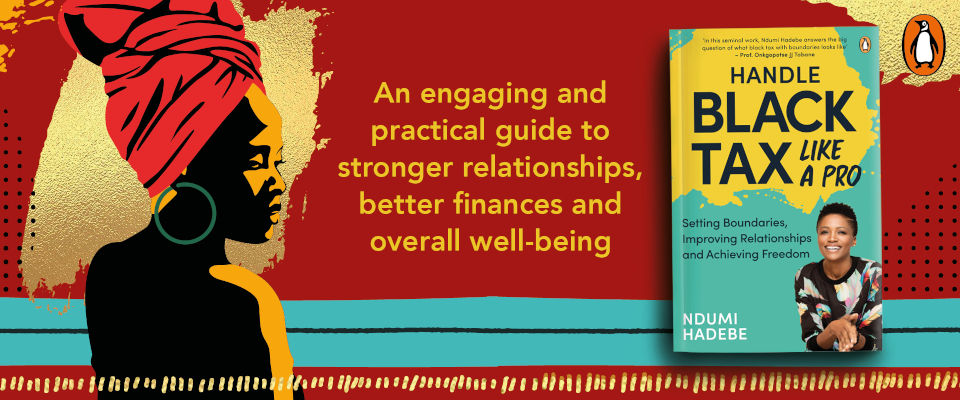Black Tax: A Fearful Endeavour – Ndumi Hadebe shares what’s on her mind
More about the book!

Requests for money by parents, siblings and other relatives carry a mental and emotional price, affecting our relationships with our loved ones and with money itself.
Helping others is commendable, but how do you do it in such a way that you avoid debt and stop the poverty cycle for future generations?
Ndumi Hadebe broaches the subject of black tax.
‘Fear is successfully keeping people in the cycle of black tax to the point of expensive debt such as credit cards and loans.’
At the beginning of 2021, I reluctantly decided to pen my views about black tax, arguing that black tax is more about boundaries than it is about money. I was never ready for what my research uncovered, one of which was learning just how much fear of a relationship breakdown was driving decisions and frustrations around black tax.
What I’d thought would be a small passion project, dragged on for close to two years. I also learned that this fear is successfully keeping people in the cycle of black tax to the point of expensive debt such as credit cards and loans.
It dawned on me that payers of black tax live in various forms fear.
Fear of speaking their truth because they fear losing the relationship in question.
Fear of being judged if they were to assert their boundaries.
And fear that they may never achieve their financial ambitions of being debt-free, or have some form of financial freedom, because of their commitments to black tax.
Yet, black tax remains an elephant in the room. While people have strong views and feelings about it, no one is talking about it with their families, with most choosing to complain to friends or on social media, which doesn’t solve the problem.
In Handle Black Tax Like a Pro, I’m hoping that people realise that – whilst these fears are valid – not addressing the core issues of black tax such as entitlement is not only damaging to our relationships with our families but damaging to our relationships with ourselves. The shame we feel for getting into debt because we fear saying no, the guilt we feel for compromising our children’s quality of life, the ongoing financial stress we endure because we lack the courage to own our truth on this issue – are all bound to induce resentment and anger towards our families.
Not being honest about our financial circumstances and where we stand on the issue of helping others at the expense of ourselves, may, at face value, seem like the safest option. Through this book, I demonstrate how this ‘safe option’ is secretly and silently crumbling the very relationships we are trying to protect because the current status quo is basing family relations more on money rather than on principles of love, compassion and values that encourage open and honest communication.
Navigating any relationship from a place of fear is detrimental to parties involved. I believe that practicing healthy boundaries is a courageous step that payers of black tax need to take. Not only for the benefit of their finances, but also in having healthier relationships with their loved ones.
Commitment to one’s personal truth will addresses more than just black tax issues because healthy boundaries organically permeate into other areas of life, such as work, romantic relationships and friendships. Practicing healthy boundaries brings about an alignment – a noteworthy sense of mental and emotional peace – and the freedom to be your authentic self.
Handle Black Tax Like A Pro is out now.
~~~
This article was originally published in The Penguin Post, a magazine from Penguin Random House South Africa.
Categories Lifestyle Non-fiction South Africa
Tags Handle Black Tax Like a Pro Ndumi Hadebe Penguin Random House SA The Penguin Post
